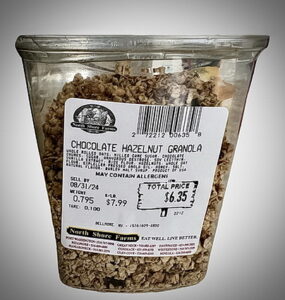
Granola is a popular breakfast and snack option that has gained a reputation for being a healthy choice that can be added to any meal. However, we need to be watchful of several factors, including its ingredients, serving size, and how it’s consumed, which will have an impact on how healthy this ingredient is. Let’s delve into the components of granola and its nutritional value to better understand its health implications.
Ingredients
Granola typically consists of rolled oats, nuts, seeds, dried fruits, sweeteners, and sometimes additional flavorings like spices or chocolate. Each ingredient contributes to its overall nutritional value. The following list details the usual ingredients found in granola.
- Rolled Oats: Oats are a good source of fiber, particularly beta-glucan, which can help lower cholesterol levels and improve heart health. They also provide complex carbohydrates, which offer sustained energy.
- Nuts and Seeds: Nuts and seeds are rich in healthy fats, protein, vitamins, minerals, and antioxidants. They can contribute to satiety and provide essential nutrients such as omega-3 fatty acids (in walnuts and flaxseeds) and magnesium (in almonds and sunflower seeds).
- Dried Fruits: Dried fruits offer natural sweetness and can provide additional fiber, vitamins, and minerals. However, they are also concentrated sources of sugar and calories, so moderation is key.
- Sweeteners: Some granolas contain added sweeteners such as honey, maple syrup, or cane sugar. While these can enhance flavor, they also contribute to the overall sugar content of the granola.
- Add some blueberries, strawberries, or other fruity items to your dish to make it even healthier.
Nutritional Value
 The nutritional value of granola can vary widely depending on the specific ingredients and their proportions. Generally, granola provides a mix of carbohydrates, protein, fat, fiber, vitamins, and minerals. Please read the label to confirm what ingredients are in it. Also, it’s important to be mindful of serving sizes, as granola can be calorie-dense.
The nutritional value of granola can vary widely depending on the specific ingredients and their proportions. Generally, granola provides a mix of carbohydrates, protein, fat, fiber, vitamins, and minerals. Please read the label to confirm what ingredients are in it. Also, it’s important to be mindful of serving sizes, as granola can be calorie-dense.
- Carbohydrates: Granola is typically a carbohydrate-rich food due to the oats and added sweeteners. Carbohydrates provide energy, but excessive consumption of refined carbohydrates (e.g., granola with high sugar content) may lead to blood sugar spikes and energy crashes.
- Protein: Nuts, seeds, and occasionally grains in granola contribute to its protein content. Protein is essential for building and repairing tissues, supporting immune function, and promoting satiety.
- Fat: Granola contains nuts, seeds, and sometimes added oils, which provide healthy fats. These fats are important for brain health, hormone production, and nutrient absorption. However, some granolas may contain unhealthy fats from added oils or processed ingredients.
- Fiber: Oats, nuts, seeds, and dried fruits in granola contribute to its fiber content. Fiber is crucial for digestive health, promoting satiety, and regulating blood sugar levels.
- Vitamins and Minerals: Granola can provide various vitamins and minerals, mainly if it contains nuts, seeds, and dried fruits. These may include vitamin E, magnesium, phosphorus, iron, and zinc.
Health Considerations
While granola can be a nutritious addition to a balanced diet, there are some considerations to keep in mind:
- Added Sugars: Some granolas contain high amounts of sugars, which can contribute to excess calorie intake and negatively impact health if consumed in large quantities. Opt for granolas with minimal added sugars, or choose unsweetened varieties.
- Portion Size: Granola is calorie-dense, so it’s important to be mindful of portion sizes. A small serving can provide a satisfying crunch and nutrient boost without excessive calorie intake.
- Processed Ingredients: Some commercial granolas may contain processed ingredients, preservatives, and additives. Choose granolas with simple, whole-food ingredients whenever possible.
- Allergens: Granola contains nuts and gluten-containing grains. If you have food sensitivities or allergies, be mindful of potential allergens.
Summary
Granola can be a nutritious and convenient option for any meal, providing a mix of carbohydrates, protein, healthy fats, fiber, vitamins, and minerals. However, choosing varieties with wholesome ingredients, minimal added sugars, and moderate portion sizes is essential. Be aware of the sugar and calorie intake, especially if you are on a diet or have certain allergies.
By incorporating a balanced amount of granola into your meal or snack alongside other nutrient-dense foods, you can enjoy its health benefits while minimizing potential drawbacks.
